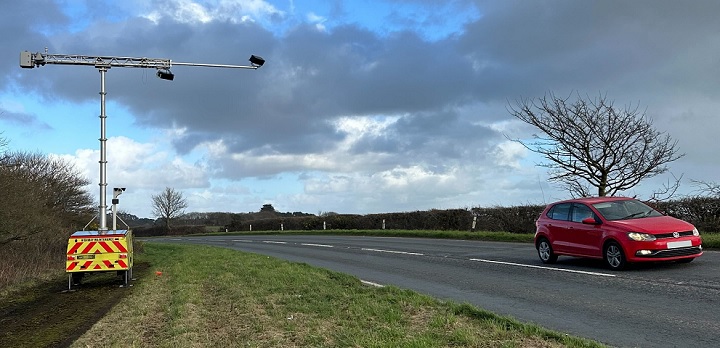
Image: Vision Zero South West
“When you drive, you hope others on the road are as switched on and as law-abiding as you are – the latest statistics show we’re helping to make that hope a reality.”
That’s according to Geoff Collins, UK general manager of road safety technology company Acusensus, after latest analysis of installations of its AI cameras across Devon and Cornwall show a long term 80% decrease in seatbelt and mobile phone detections.
Acusensus developed its Heads Up AI technology which uses specially equipped cameras to see through the windscreen and into the vehicle, to identify cases where people are not wearing a seatbelt or using a mobile phone as they drive past.
Geoff Collins said: “Over the three years our relocatable cameras have been in the region, we’ve seen a consistent drop in the number of people we see holding their phone or not correctly wearing a seatbelt.
“In a typical one month long operation, we see a reduction of between a third and a half, but this trend continues long term – even if we haven’t been back to that site for months, the detection rates remain suppressed, then continue to drop when we return.
“Sustained, region wide deployment is proving to be effective, so people don’t just behave when and where a trailer or camera is there – entrenched bad habits seem to be reducing. We’re changing behaviour, which is what this is about, not just ‘catching’ people.”
The cameras are designed to improve road safety by tackling two of the fatal five behaviours most likely to lead to death in a crash – handheld mobile phone use and not wearing a seatbelt.
The system is fitted on mobile trailers which are regularly moved around to monitor different sections of road.
Over the last three years, the Devon and Cornwall force area has seen a reduction in the number of people killed and seriously injured (KSI) on its roads, through a range of road safety interventions, including the use of Heads-Up.
In 2022 their KSI figure was 790, which dropped to 754 in 2023 and then down to 678 in 2024, with these latest figures in contrast to the national picture which has plateaued over this time.
“High local awareness of the programme and technology helps a lot,” Mr Collins added, “media coverage and clear, appropriate messaging around what is being done and why.
“It has got the conversation going amongst road users, as can be seen on motoring discussion forums, where an impressively high proportion of contributors indicate that they support a clamp down.”
Studies show that drivers texting on a mobile phone can be 23 times more likely to be involved in a crash, while the Parliamentary Advisory Council for Transport Safety (PACTS) reports that 30% of vehicle occupants killed in road collisions were found not to be wearing a seatbelt.
The Heads-Up system uses two cameras to take high-speed front-facing and overhead images of vehicles, with AI applied to detect any potential seatbelt or mobile phone offences.
The images are then verified by at least two human reviewers to determine whether an offence has taken place; and if one is identified, the driver will either be sent a warning letter or a notice of intended prosecution, depending on the severity.
Acusensus has already delivered the technology to 19 police force regions in trials and operational projects across the UK.
“Our technology makes an impossible task possible,” Geoff Collins concludes. “We are keeping roads safer for everyone by identifying two of the fatal five behaviours. We are demonstrating an approach that can be replicated and is showing real world results.”
Comment on this story